Abstract
A population balance equation (PBE) mathematical model for analyzing platelet aggregation kinetics was developed in Part I (Huang, P. Y., and J. D. Hellums. 1993. Biophys. J. 65: 334-343) of a set of three papers. In this paper, Part II, platelet aggregation and related reactions are studied in the uniform, known shear stress field of a rotational viscometer, and interpreted by means of the model. Experimental determinations are made of the platelet-aggregate particle size distributions as they evolve in time under the aggregating influence of shear stress. The PBE model is shown to give good agreement with experimental determinations when either a reversible (aggregation and disaggregation) or an irreversible (no disaggregation) form of the model is used. This finding suggests that for the experimental conditions studied disaggregation processes are of only secondary importance. During shear-induced platelet aggregation, only a small fraction of platelet collisions result in the binding together of the involved platelets. The modified collision efficiency is approximately zero for shear rates below 3000 s-1. It increases with shear rates above 3000 s-1 to about 0.01 for a shear rate of 8000 s-1. Addition of platelet chemical agonists yields order of magnitude increases in collision efficiency. The collision efficiency for shear-induced platelet aggregation is about an order of magnitude less at 37 degrees C than at 24 degrees C. The PBE model gives a much more accurate representation of aggregation kinetics than an earlier model based on a monodispersed particle size distribution.
Full text
PDF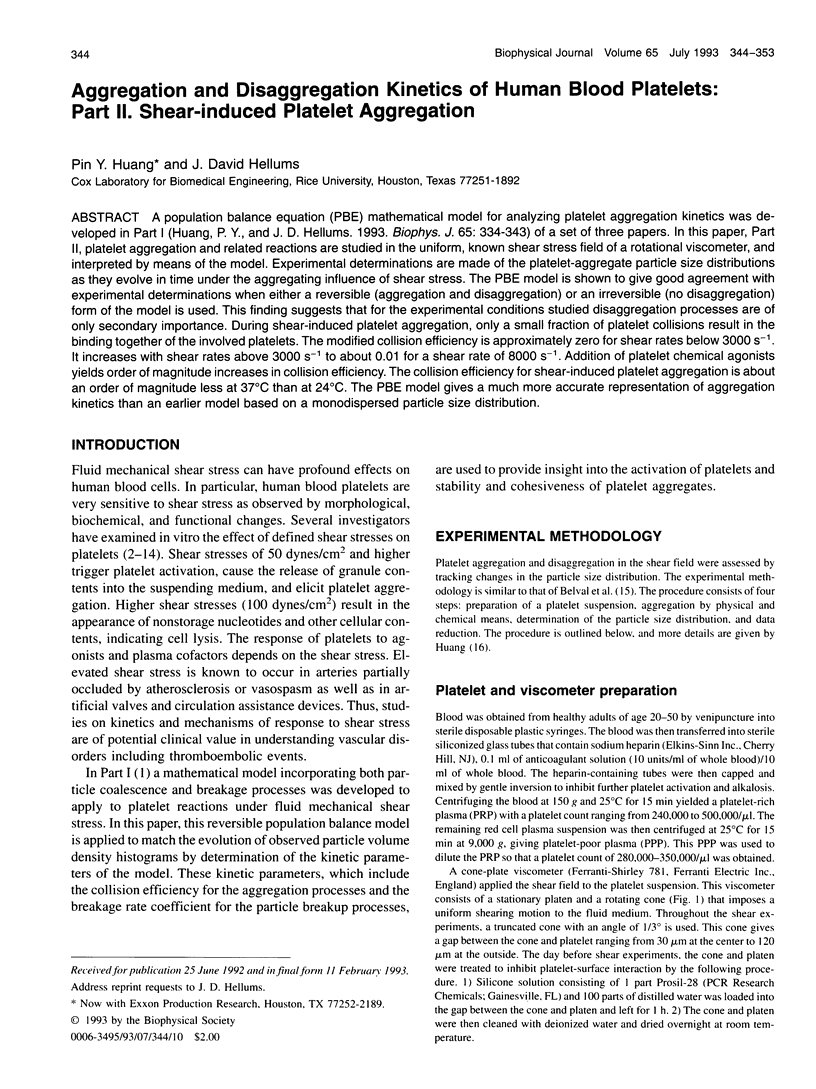
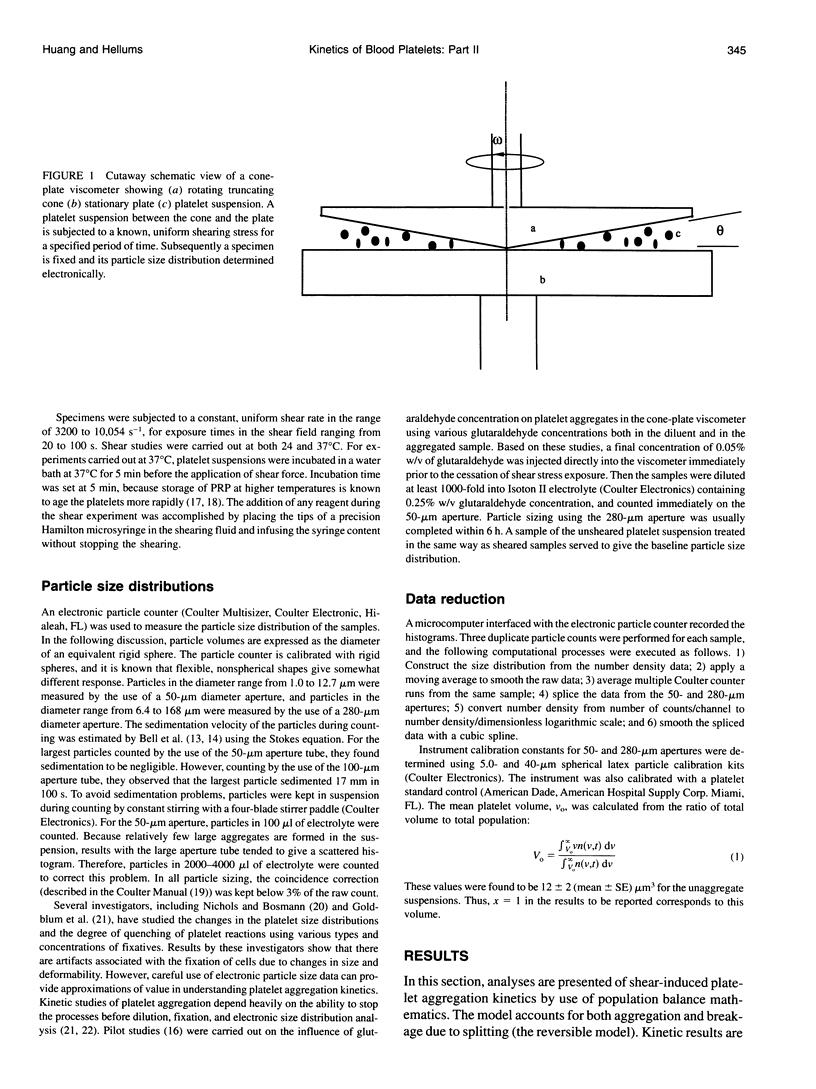
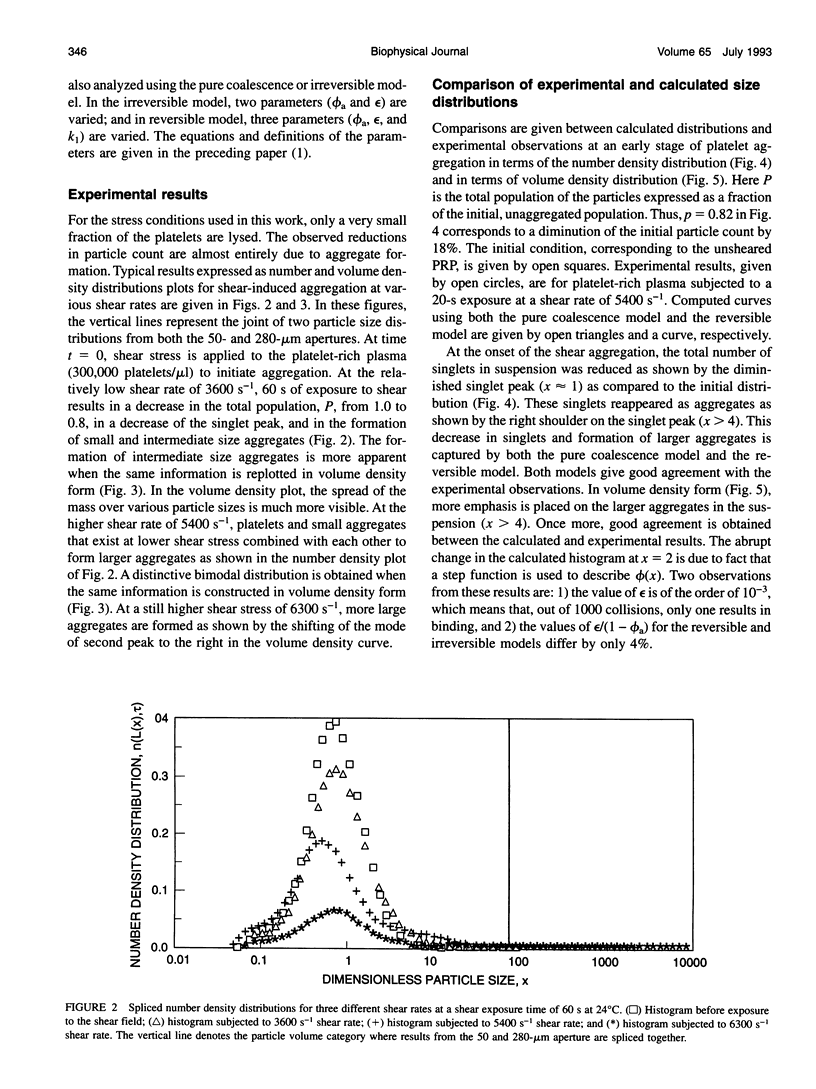
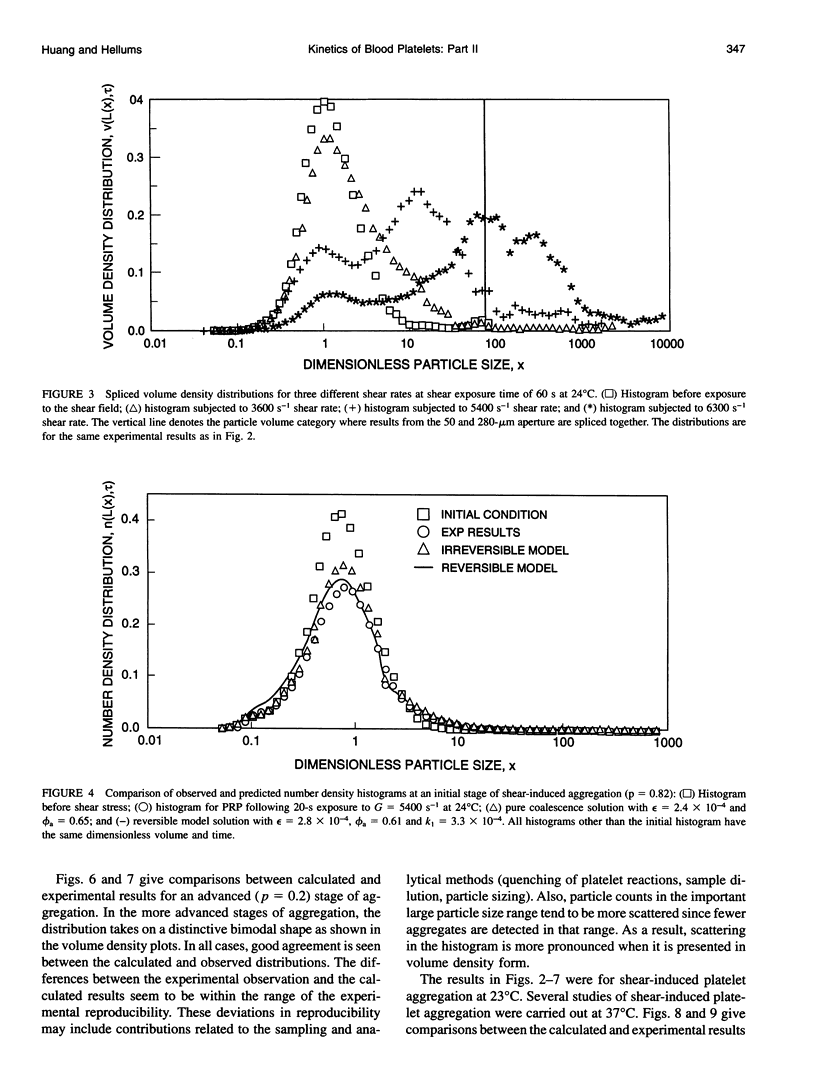
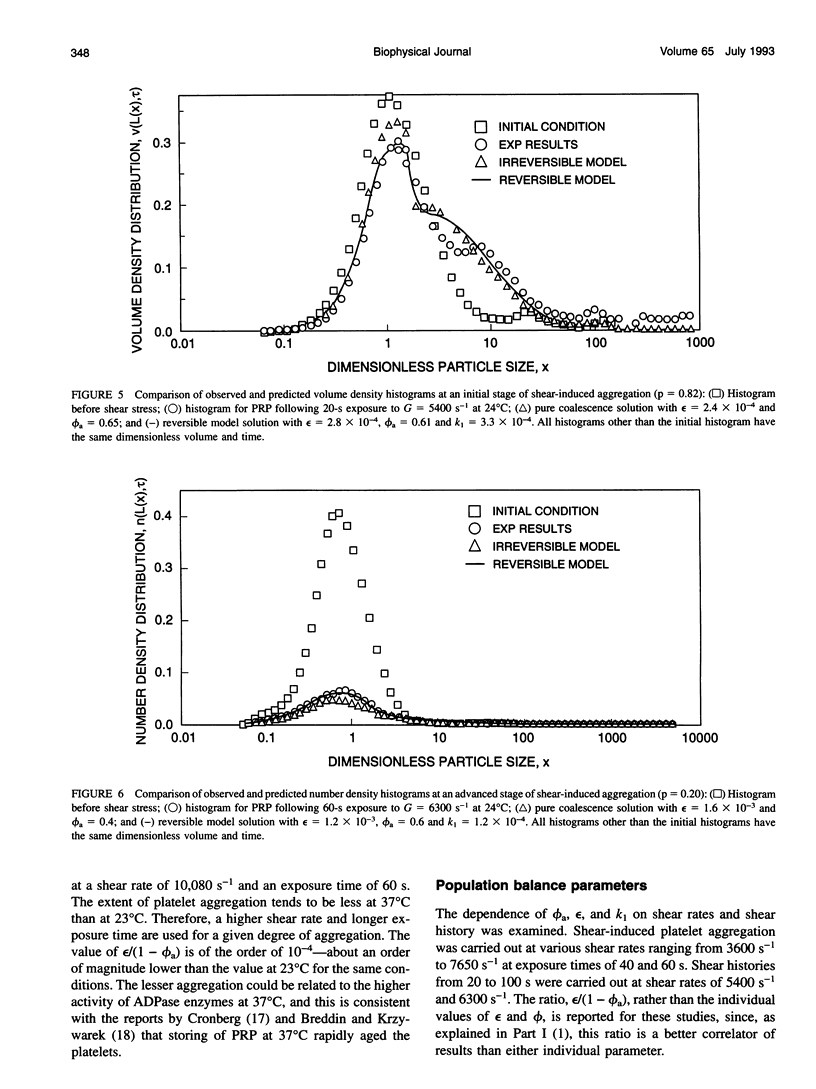
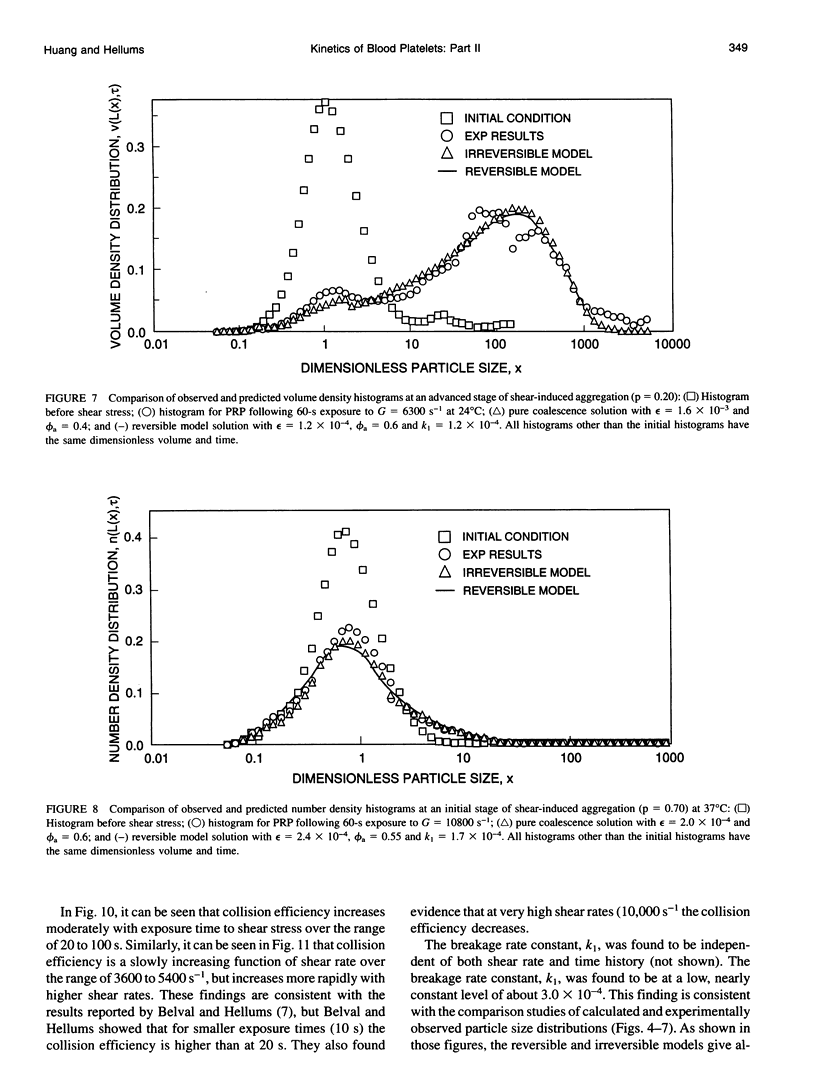
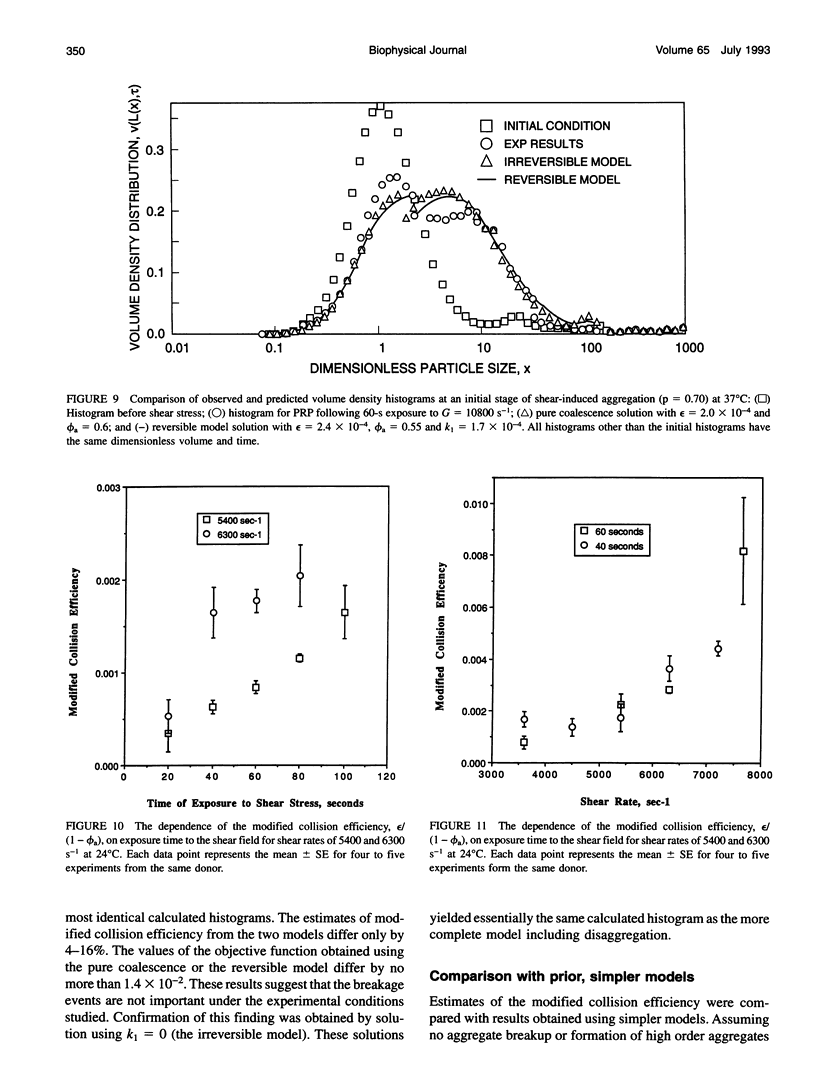
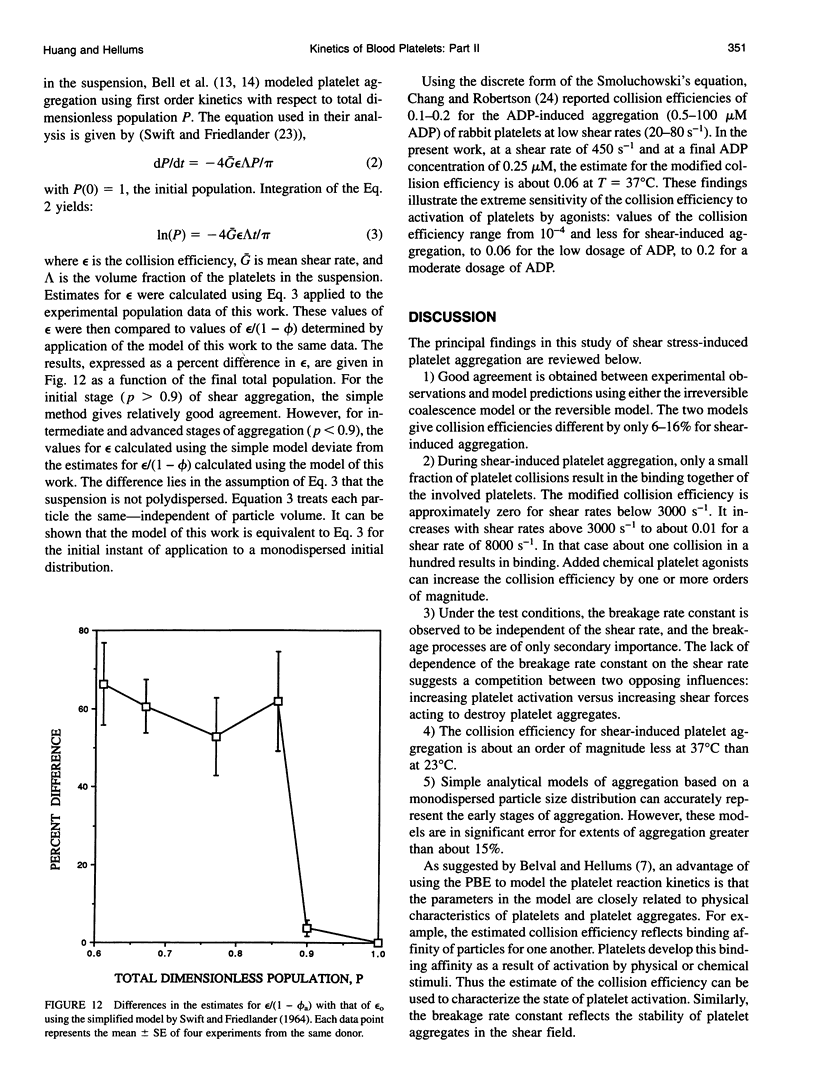
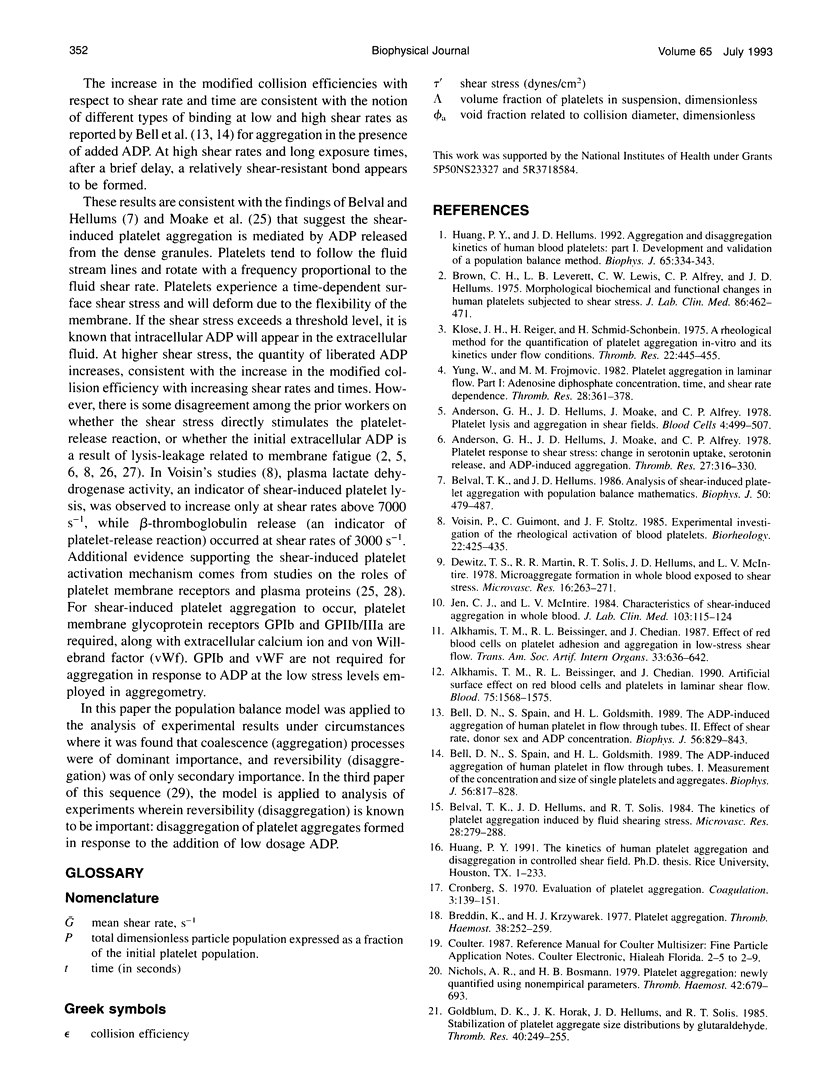
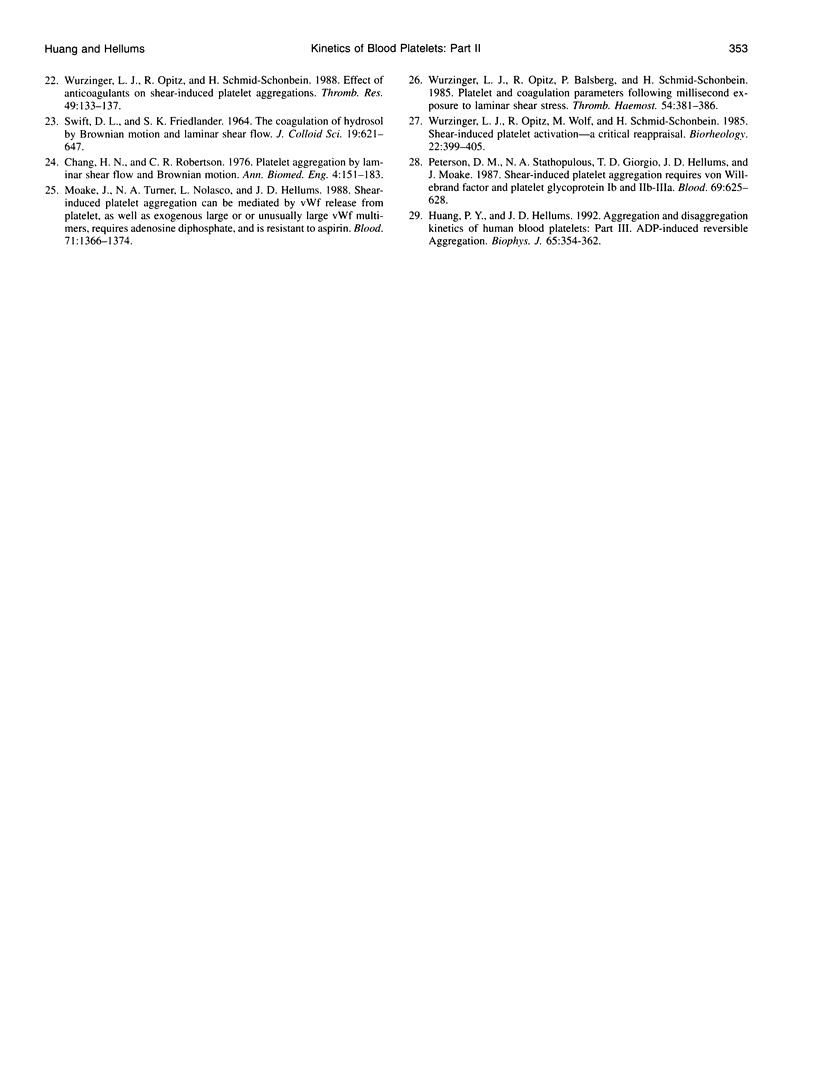
Selected References
These references are in PubMed. This may not be the complete list of references from this article.
- Alkhamis T. M., Beissinger R. L., Chediak J. R. Artificial surface effect on red blood cells and platelets in laminar shear flow. Blood. 1990 Apr 1;75(7):1568–1575. [PubMed] [Google Scholar]
- Alkhamis T. M., Beissinger R. L., Chedian J. R. Effect of red blood cells on platelet adhesion and aggregation in low-stress shear flow. ASAIO Trans. 1987 Jul-Sep;33(3):636–642. [PubMed] [Google Scholar]
- Anderson G. H., Hellums J. D., Moake J. L., Alfrey C. P., Jr Platelet lysis and aggregation in shear fields. Blood Cells. 1978;4(3):499–511. [PubMed] [Google Scholar]
- Bell D. N., Spain S., Goldsmith H. L. Adenosine diphosphate-induced aggregation of human platelets in flow through tubes. I. Measurement of concentration and size of single platelets and aggregates. Biophys J. 1989 Nov;56(5):817–828. doi: 10.1016/S0006-3495(89)82728-6. [DOI] [PMC free article] [PubMed] [Google Scholar]
- Bell D. N., Spain S., Goldsmith H. L. Adenosine diphosphate-induced aggregation of human platelets in flow through tubes. II. Effect of shear rate, donor sex, and ADP concentration. Biophys J. 1989 Nov;56(5):829–843. doi: 10.1016/S0006-3495(89)82729-8. [DOI] [PMC free article] [PubMed] [Google Scholar]
- Belval T. K., Hellums J. D. Analysis of shear-induced platelet aggregation with population balance mathematics. Biophys J. 1986 Sep;50(3):479–487. doi: 10.1016/S0006-3495(86)83485-3. [DOI] [PMC free article] [PubMed] [Google Scholar]
- Belval T., Hellums J. D., Solis R. T. The kinetics of platelet aggregation induced by fluid-shearing stress. Microvasc Res. 1984 Nov;28(3):279–288. doi: 10.1016/0026-2862(84)90001-3. [DOI] [PubMed] [Google Scholar]
- Brown C. H., 3rd, Leverett L. B., Lewis C. W., Alfrey C. P., Jr, Hellums J. D. Morphological, biochemical, and functional changes in human platelets subjected to shear stress. J Lab Clin Med. 1975 Sep;86(3):462–471. [PubMed] [Google Scholar]
- Chang H. N., Robertson C. R. Platelet aggregation by laminar shear and Brownian motion. Ann Biomed Eng. 1976 Jun;4(2):151–183. doi: 10.1007/BF02363645. [DOI] [PubMed] [Google Scholar]
- Dewitz T. S., Martin R. R., Solis R. T., Hellums J. D., McIntire L. V. Microaggregate formation in whole blood exposed to shear stress. Microvasc Res. 1978 Sep;16(2):263–271. doi: 10.1016/0026-2862(78)90059-6. [DOI] [PubMed] [Google Scholar]
- Goldblum D. K., Horak J. K., Hellums J. D., Solis R. T. Stabilization of platelet aggregate size distributions by glutaraldehyde. Thromb Res. 1985 Oct 15;40(2):249–255. doi: 10.1016/0049-3848(85)90336-6. [DOI] [PubMed] [Google Scholar]
- Huang P. Y., Hellums J. D. Aggregation and disaggregation kinetics of human blood platelets: Part I. Development and validation of a population balance method. Biophys J. 1993 Jul;65(1):334–343. doi: 10.1016/S0006-3495(93)81078-6. [DOI] [PMC free article] [PubMed] [Google Scholar]
- Huang P. Y., Hellums J. D. Aggregation and disaggregation kinetics of human blood platelets: Part III. The disaggregation under shear stress of platelet aggregates. Biophys J. 1993 Jul;65(1):354–361. doi: 10.1016/S0006-3495(93)81080-4. [DOI] [PMC free article] [PubMed] [Google Scholar]
- Jen C. J., McIntire L. V. Characteristics of shear-induced aggregation in whole blood. J Lab Clin Med. 1984 Jan;103(1):115–124. [PubMed] [Google Scholar]
- Moake J. L., Turner N. A., Stathopoulos N. A., Nolasco L., Hellums J. D. Shear-induced platelet aggregation can be mediated by vWF released from platelets, as well as by exogenous large or unusually large vWF multimers, requires adenosine diphosphate, and is resistant to aspirin. Blood. 1988 May;71(5):1366–1374. [PubMed] [Google Scholar]
- Nichols A. R., Bosmann H. B. Platelet aggregation: newly quantified using non-empirical parameters. Thromb Haemost. 1979 Aug 31;42(2):679–693. [PubMed] [Google Scholar]
- Peterson D. M., Stathopoulos N. A., Giorgio T. D., Hellums J. D., Moake J. L. Shear-induced platelet aggregation requires von Willebrand factor and platelet membrane glycoproteins Ib and IIb-IIIa. Blood. 1987 Feb;69(2):625–628. [PubMed] [Google Scholar]
- Voisin P., Guimont C., Stoltz J. F. Experimental investigation of the rheological activation of blood platelets. Biorheology. 1985;22(5):425–435. doi: 10.3233/bir-1985-22506. [DOI] [PubMed] [Google Scholar]
- Wurzinger L. J., Opitz R., Blasberg P., Schmid-Schönbein H. Platelet and coagulation parameters following millisecond exposure to laminar shear stress. Thromb Haemost. 1985 Aug 30;54(2):381–386. [PubMed] [Google Scholar]
- Wurzinger L. J., Opitz R., Schmid-Schönbein H. Effect of anticoagulants on shear-induced platelet alterations. Thromb Res. 1988 Jan 1;49(1):133–137. doi: 10.1016/0049-3848(88)90367-2. [DOI] [PubMed] [Google Scholar]
- Wurzinger L. J., Opitz R., Wolf M., Schmid-Schönbein H. "Shear induced platelet activation"--a critical reappraisal. Biorheology. 1985;22(5):399–413. doi: 10.3233/bir-1985-22504. [DOI] [PubMed] [Google Scholar]
- Yung W., Frojmovic M. M. Platelet aggregation in laminar flow. I. Adenosine diphosphate concentration, time and shear rate dependence. Thromb Res. 1982 Nov 1;28(3):361–377. doi: 10.1016/0049-3848(82)90118-9. [DOI] [PubMed] [Google Scholar]


